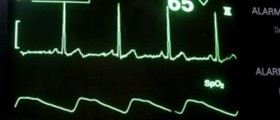
Rythmol
Rythmol is an antiarrhythmic medicine that doctors usually prescribe to treat irregular heartbeat, as well as to keep a normal heart functioning or rhythm in those who do not have any structural disease of the heart. This medicine has very effective impact on the fibers of the heart, thus controlling heartbeat.
Side effects of Rythmol
It is very important that, before taking this medicine, you go and consult the doctor, because this medicine, as all others, has its side effects that may be very serious sometimes. If a person suffers from any heart disease, certain side effects of this drug may occur. These side effects include heart failure, worsen arrhythmia, cardiovascular toxicity and conduction disorder. The most common cardiovascular side effects of Rythmol may be very serious in the majority of cases. Using this drug may lead to bradycardia, accelerated reentrant tachycardia and ventricular tachycardia. The patients that use this medicine may also experience sinus pauses and arrest and torsades de pointes. There have been cases in which this medicine caused congestive heart failure.
Rythmol has its characteristic nervous system side effects as well. Headache and dizziness, as well as fatigue and ataxia are the most frequent nervous system adverse effects. There has been a case when myasthenia occurred as the result of consuming this medicine, and it was accompanied with limb weakness, diplopia, ptosis, dysphagia and dysarthria. Peripheral neuropathy is one more side effect of Rythmol on the nervous system.
Of gastrointestinal side effects, stomach upset, nausea, and vomiting are the usual side effects, but in addition to these, metallic taste and constipation are also very likely to happen when a person takes Rythmol. Eye irritation and abnormal or blurred vision are two most common ocular side effects, while of dermatologic side effects only one was reported, and it is acute generalized exanthematous pustulosis. Rythmol can have unwanted effects on the respiratory system as well, because the use of this drug may cause the constrictions of bronchia and breathlessness. In several cases dyspnea appeared.
Rarely hematological side effects occur. However, if they appear they include leucopenia, anemia, purpura and agranulocytosis. Furthermore, Rythmol may lead to granulocytopenia, thrombocytopenia and profound neutropenia. Hepatotoxicity and cholestasis are two most common hepatic side effects of Rythmol. Of psychiatric side effects, the most frequently reported are insomnia, paranoia, psychosis and hallucinations. Rythmol is a drug that may cause certain immunologic side effects, such as the appearance of lupus-like syndrome and elevated ANA titer. Moreover, facial photosensitive rash and generalized erythema are also some of the immunologic side effects that have been reported.

















Your thoughts on this
Loading...